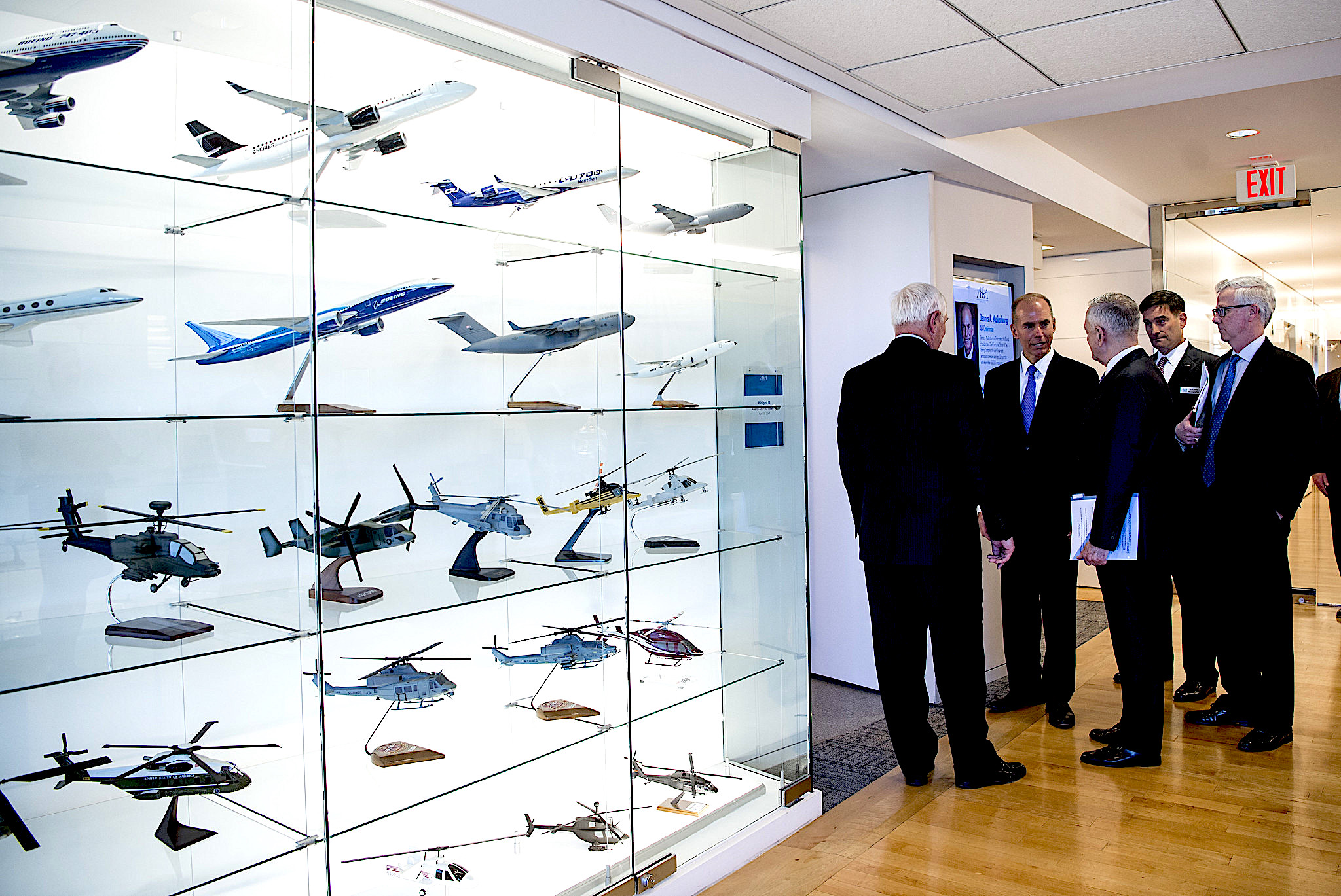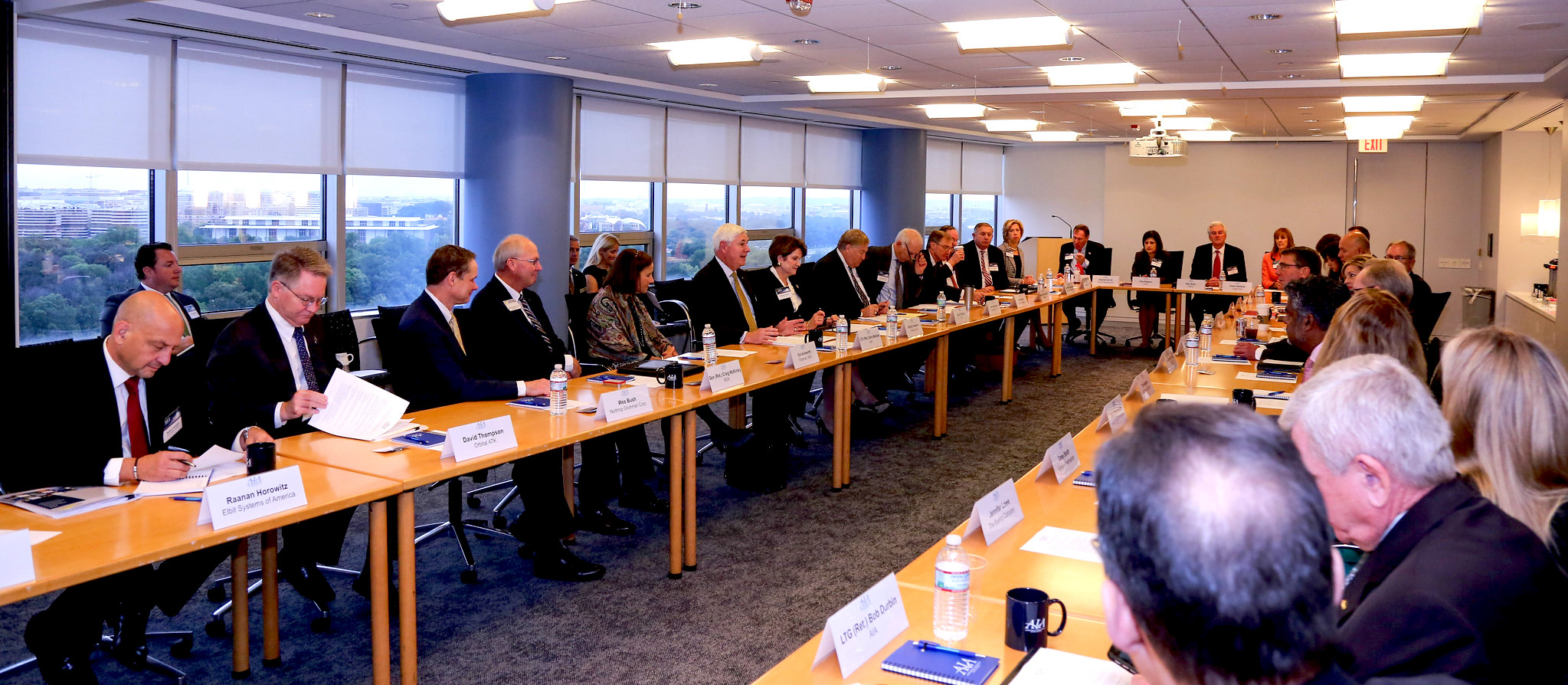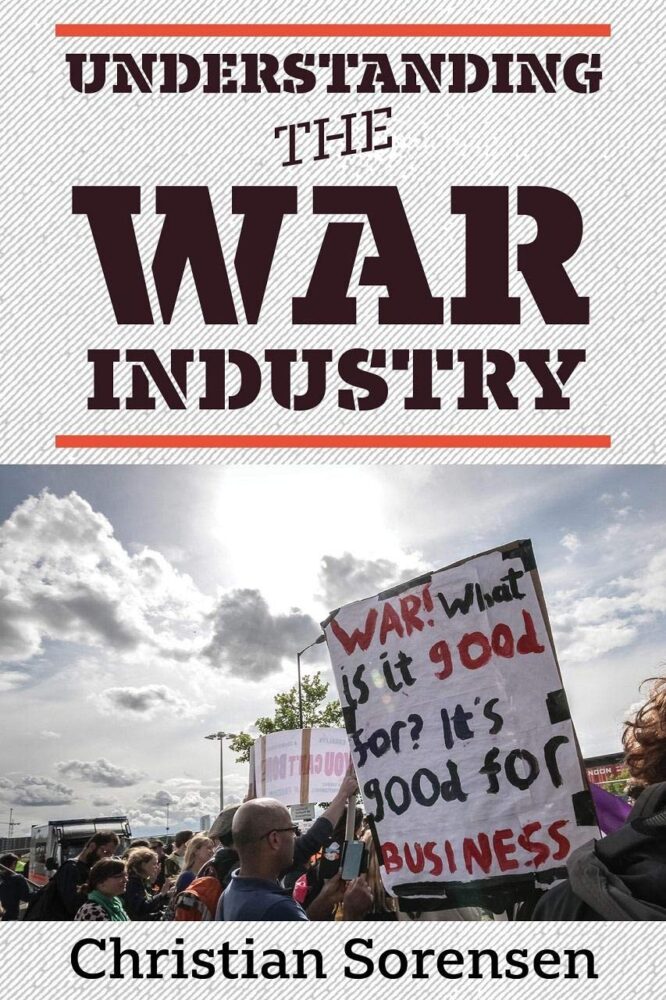When war is your business, peace is your enemy, writes Christian Sorensen. Third in a five-part series on the military-industrial-congressional complex.

The Association of the United States Army emblem hanging in the Washington Convention Center in Washington D.C., 2008. (U.S. Army, D. Myles Cullen)
By Christian Sorensen
Special to Consortium News
 Congress does not exercise effective oversight of the military-industrial-congressional complex. The average congressperson is clueless about the intricacies of war, espionage, and peace. The average congressperson on Armed Services or Intelligence committees is more aware, but their views are carefully circumscribed by a capitalist imperative for profit and the information that armed bureaucracies selectively divvy out.
Congress does not exercise effective oversight of the military-industrial-congressional complex. The average congressperson is clueless about the intricacies of war, espionage, and peace. The average congressperson on Armed Services or Intelligence committees is more aware, but their views are carefully circumscribed by a capitalist imperative for profit and the information that armed bureaucracies selectively divvy out.
War corporations hire professional lobbying firms in order to influence federal policy. War corporations regularly spend millions on lobbying Capitol Hill. This is an effective, straightforward method for corporations to get their way. Jimmy Williams, a former lobbyist explained the system: “Years of legalized bribery had exposed me to the worst elements of our country’s political workings. Not even my half-million-a-year salary could outweigh my conscience… Today, most lobbyists are engaged in a system of bribery but it’s the legal kind, the kind that runs rampant in the corridors of Washington…”
Williams continued:
“Unlimited expense accounts, nights out on the town, expensive bottles of wine, elaborate meals with sitting senators and Congress members — that was my life… It was an endless cycle of money trading hands for votes. It’s a wonder members of the House and Senate actually have time to legislate when they spend so much of their damn time raising money… Every fundraiser was yet another legal bribe. Every committee hearing I’d look up and think, ‘I just bought his vote.’ And every time I got a bill passed or, better yet, killed, I’d think to myself, ‘That wouldn’t have worked if I hadn’t bought the outcome.’”

April 2017: U.S. Secretary of Defense Jim Mattis meeting with representatives from Aerospace Industries Association, National Defense Industrial Association and the Professional Services Council.
(DOD, Brigitte N. Brantley)
Industry operates pressure groups, sundry 501(c) organizations. The most effective pressure groups include the National Defense Industrial Association (NDIA), Aerospace Industries Association (AIA), Association of the United States Army (AUSA), and Business Executives for National Security (BENS). Pressure groups are not legally lobbying firms, but they influence the military and Capitol Hill consistently and effectively. These groups advocate for gigantic military and intelligence budgets and “industry-developed” government regulation. Pressure groups arrange congressional testimony, issue fact sheets and policy packets that frame legislative debate, and give awards to sitting generals and admirals. Pressure groups frequently produce Industry Guides in order to “place your company in front of your customers.”

October 2016: U.S. Secretary of Defense Ash Carter meets with members of the Aerospace Industries Association in Rosslyn, Virginia. (Dan Stohr, AIA, U.S. Secretary of Defense, Flickr, CC BY 2.0)
Most importantly, pressure groups sponsor and support industry displays (e.g. NDIA, Air Armaments Symposium; AIA, Dubai Air Show; and AUSA, Global Force Symposium & Exposition in Huntsville) highlighting the latest goods and services. Such displays are where corporate representatives schmooze with military honchos (officer and civilian) and pitch goods, services, and recommendations to those directing the wars. A pressure group may state it was “founded to educate its constituencies on all aspects of national security.” This is one way to lobby without lobbying. Many pressure groups adopt this “educating constituencies” character.
Retired flag officers and corporate titans lead pressure groups. For example, retired Army General Joseph Votel, former commander of U.S. Central Command, is now in charge of BENS, a group supported by a leadership team and board of directors comprised of wealthy capitalists. Pentagon officials are in regular contact with pressure groups. The director of the Defense Security Cooperation Agency (the U.S. government agency in charge of abetting industry sales to allied capitalist governments), for example, has indicated that he regularly talks to and collaborates with pressure groups. Industry has crafted pressure groups of all shapes, sizes, and dispositions. Pressure groups are conduits of industry desires.

Attendees taking a selfie in front of an F/A-18 Super Hornet at the Dubai Airshow, November 2019. (Official U.S. Navy Page, Flickr, Mike Lenart)
Seemingly mild traditions function as political persuasion. Elected officials touring war corporations (e.g. Senator Gary Peters visiting BAE Systems, Senator Jeanne Shaheen visiting L3) and military installations (e.g. Senator Martin Heinrich at a drone squadron on Holloman Air Force Base, New Mexico; Senator Tim Kaine at naval bases in Hampton Roads, Virginia) is such a tradition. Elected officials are shown industry’s products, regaled with job tallies and bold claims about economic impact, and battered with refined talking points. The costs of war — financial, physical and emotional — are tucked out of sight.

Aug. 23, 2017: U.S. Rep. Jim Banks poses with U.S. military commanders in front of a KC-135 Stratotanker during a tour of Grissom Air Reserve Base, Indiana. (U.S. Air Force, Benjamin Mota)
Influencing Media
A handful of business interests owns media outlets in the United States. Profit drives corporate media. U.S. corporate media (CNN, MSNBC, FoxNews, et al.) operate under the same business model: air what attracts the highest ratings in order to generate more advertising revenue. Corporate media air info-tainment, designed not to inform or foster critical thinking about the world. Informing the public is not a priority. Maintaining the existing economic order is.
Please Support Our Spring Fund Drive!
To the extent that corporate media air any credible information at all, the information reflects the opinions of the ruling class and capitalist dogma. There is no room to firmly address domestic issues (e.g. exploitation of the working class, dismal public education, petroleum dependency, two corrupt political factions, government subsidies of harmful industries, GMOs and plastics in our food chain, war) or their root causes. Politically conditioning the U.S. public, corporate media do not blame the MIC or capitalism for any of the problems in the world.

Inside NPR headquarters in Washington, D.C., 2013. (Ted Eytan, CC BY-SA 2.0, Wikimedia Commons)
Aiming for high ratings and lucrative advertising revenue, corporate media self-censor and taper the spectrum of acceptable foreign policy debate. War corporations purchase advertisements on news shows to further circumscribe the debate, as corporate pundits and newscasters typically do not speak out against advertisers. Pro-war is as pro-war does.
Corporate media hire career militants (former CIA Director John Brennan, MSNBC; former CIA Deputy Director Mike Morrell, CBS News; retired General Jack Keane, FoxNews) who further confine the debate. Retired generals and admirals regularly contribute to all forms of corporate media, often without disclosing existing ties to war corporations and/or financial investments in war.
The Smith-Mundt Modernization Act of 2012 increased government propaganda in corporate media. Drawing funding from the wealthy donor class and large corporate interests, National Public Radio is similarly confined. NPR’s CEO is John Lansing, who was previously employed as chief propagandist at the U.S. Agency for Global Media, which runs Voice of America and Radio Free Europe/Radio Liberty.
Capital dominates other media through which people learn about war. Regent Equity Partners owns Sightline Media Group, whose products include most of the major military-focused periodicals: Air Force Times, Army Times, C4ISRNET, Defense News, Federal Times, Marine Corps Times, and Navy Times. Private equity prioritizes profit. And when war is profit, earnest questions are sacrilege.
The Pentagon runs its own massive media empire, coordinated by the Assistant to the Secretary for Public Affairs, further polluting the minds of the working class.
Hollywood collaborates with government in disseminating propaganda. If you are a producer wanting to make a movie involving military or paramilitary operations, you’re going to want assistance from the Pentagon or CIA in acquiring matériel, an important part of producing an enthralling film. The Pentagon and CIA are happy to help, at a price: they must approve your movie’s script. If the script questions the accepted benevolence of U.S. foreign policy, the movie won’t receive support from the Pentagon or CIA. Dedicated offices in Arlington and McLean, Virginia, liaise with Hollywood.
 The second role Hollywood performs is demonizing Arabs, Persians, Muslims, and other official enemies — priming the public to loathe the stereotypical enemies on the receiving end of U.S. ordnance. The final role Hollywood plays is to function as a recruiter: Blockbuster films put forth alluring portrayals of military and intelligence activities, seducing new generations into believing the thrill or benevolence of such undertakings.
The second role Hollywood performs is demonizing Arabs, Persians, Muslims, and other official enemies — priming the public to loathe the stereotypical enemies on the receiving end of U.S. ordnance. The final role Hollywood plays is to function as a recruiter: Blockbuster films put forth alluring portrayals of military and intelligence activities, seducing new generations into believing the thrill or benevolence of such undertakings.
For example, Hollywood makes CIA case officers look like shoot-’em-up cowboys and martial arts masters, when in reality most CIA case officers are not athletic, possess little to no martial arts skill, and are almost never in danger overseas. For a more realistic portrayal, see Ishmael Jones’ The Human Factor: Inside The CIA’s Dysfunctional Intelligence Culture, Philip Agee’s CIA Diary, and Marks & Marchetti’s The CIA and the Cult of Intelligence.
Think Tanks
Think tanks guide the discourse inside the Beltway. Think tanks promote views advantageous to their funders. Think tanks issue information that endorses and advances the ideology and profits of their benefactors. And it is U.S. war corporations that fund major Washington think tanks. In turn, the think tanks invent, hype, and promote new threats and new rationalizations for why the United States must maintain a global military presence and fight wars.
Like most parts of the MIC, employees of think tanks self-select: People with deep empathy, strong morals, and an understanding of the brutalities of U.S. foreign policy do not become part of the war industry’s think tanks. Such an environment reliably and loudly produces report after report, panel after panel, and interview after interview, about Iran’s “malign activities,” China’s “destabilizing influence,” Russian “aggression,” and various Arabs’ and Afghans’ “terrorism.”
 Corporate media then amplify this disinformation. Think tanks also swarm presidential candidates when they are assembling their foreign policy teams, ensuring foreign policy options remain within confines benefitting the MIC.
Corporate media then amplify this disinformation. Think tanks also swarm presidential candidates when they are assembling their foreign policy teams, ensuring foreign policy options remain within confines benefitting the MIC.
Finally, there is no need for you, a congressperson, to go to the Congressional Budget Office when a think tank (that takes money from the same war corporations your campaign takes money from) will promptly provide you with a silky-smooth, pro-war report. In fact, many think tanks draft legislation for congresspeople who receive campaign funding from the war industry.
When war is your business, peace is your enemy.
The MIC incessantly fabricates threats. Threats — both specific and vague — sustain the racket.
The world is filled with all kinds of threats, including advanced persistent threats, affiliates, biological agents, black identity extremists, dark networks, dirty bombs, great powers, guerrillas, hackers, insurgents, malicious actors, non-compliant governments, non-state actors, a non-state hostile intelligence service, people who don’t accept state violence or intimidation, regimes, rogue states, special interest aliens, terrorists, unaccompanied immigrant children, and unprivileged enemy belligerents.
All of these “threats,” real or not, are hyped. Reality — for example, you have a greater chance of getting struck by lightning in the United States than falling victim to a Muslim terrorist attack — is ignored. Glazing the public with layers of fear, threats can sell any good or service imaginable, thereby benefitting industry. Threats can justify sky-high budgets, invasive legal authorities, and bloated bureaucracies, all benefitting the Pentagon.
Third in a five-part series by the author. Part 4 will be published on Monday.
Christian Sorensen is an independent journalist mainly focused on war profiteering within the military-industrial complex. An Air Force veteran, he is the author of the recently published book, Understanding the War Industry. He is also a senior fellow at the Eisenhower Media Network (EMN), an organization of independent veteran military and national security experts. His work is available at War Industry Muster.
The views expressed are solely those of the author and may or may not reflect those of Consortium News.
Please Support Our
Spring Fund Drive!



Which means no one represents the interests of U.S as a country and the people of that country But,how long will this continue go on and is it really sustainable say,for the next 20 years?
Profit cannot be the only reason for endless wars. I fear we have a lot of societal blood lust. Many of use like the idea of attacking weaker countries, doing all the atrocities of our Indian wars.
Thank you CN for this excellent series. There was a saying back in the anti war days of the the Vietnam war; Military solutions are problems. The narrative managers have worked their magic to persuade people not to see just how big a problem the war solution has become. Those who understand have our work cut out for us.
Lois Gagnon
Green-Rainbow Party of Massachusetts
“When war is your business, peace is your enemy.” Just about says it all.
To paraphrase Schultz’s Pogo: We have found the enemy and it is us.
The founder of Dubai, Sheikh Rashid, was asked about the future of his country, and he replied,
“My grandfather rode a camel, my father rode a camel, I ride a Mercedes, my son rides a Land Rover, and my grandson is going to ride a Land Rover, but my great-grandson is going to have to ride a camel again.”
Why is that, he was asked? And his reply was,
“Hard times create strong men. Strong men create easy times.
“Easy times create weak men, weak men create difficult times.
“Many will not understand it, but you have to raise warriors, not parasites.”
And add to that the historical reality that all great “empires”… the Persians, the Trojans, the Egyptians, the Greeks, the Romans and in later years the British … all rose and perished within 240 years.
Each “rotted from within”. America has now passed that 240year mark and the “rot” is visible all around us and now accelerating quickly. They are past the Mercedes and Land Rover Years, and the camels are in their yards.
hXXps://www.youtube.com/watch?v=8K84HkfUcEE
” In the councils of government, we must guard against the acquisition of unwarranted influence , whether sought or unsought by the Military Industrial Complex . The potential for a disastrous rise of misplaced power exists and will persist .” President Eisenhower 1961.
Thank you Consortium News for this series. It uncovers and makes plain the sources of the militarism plaguing our world.
The question is how to break this cycle.
I will refer to Catiline Johnstone for this. It is about Narrative, and the creation of a positive narrative that does not subscribe to the world view that supports this. For me this is a world view that embraces complexity, community and a bottom up structure where the power rests at the local level and as you go up it is about facilitating co-operation between localities.
This is a world view that is modeled after “ecologies” not machines that can be “Commanded & Controlled”. A forest has no King, and while the forest interacts with the lake, the Deer Lobby doesn’t get to dictate to the Fish
National security is not different from health and education in that you can postulate many goals, propose budgets to achieve them, but at the end of the day society can give only so much.
Strangely enough, conservatives tend to be very tight fisted with health and education, but they never apply the adage “you cannot just throw money on problems” to defense.
Even stranger, liberals have less tight fisted impulses, but somehow only very few of them realize that the waste of resources on defense, if cut, would direct funds and minds to their priorities — at least the “professional liberals”, politicians etc.
A hilarious example I read recently was about the threat in the Arctic, where Russian ships sail freely and USA has a measly total of one icebreakers. Governor of Alaska laments that Russians encroach Alaskan waters. They really do? Further down in the article there is a sentence that several times in the last decade Alaskan towns had to request Russian services to get necessary supplies, as Russians do have icebreakers. So far, cooler heads prevailed, icebreaker program is TOTALLY unnecessary for USA, and on the rare occasion when you need one you can ask neighbors to help you, for a fee.
Unfortunately, plying South China Sea is nowhere as un-attractive for sailors and officers as Arctic, so our gallant fleet sails back and forth, occasionally banging at civilian vessels.
Excellent series. I commend you. Thanks.